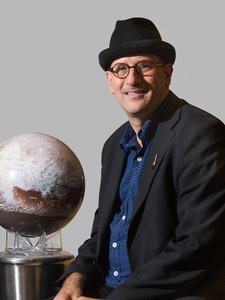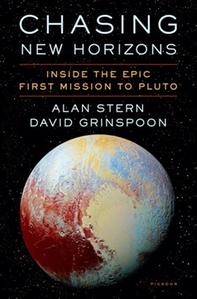
|
|
| photo: Henry Throop | |
Dr. David Grinspoon is an astrobiologist involved in several NASA interplanetary missions. His new book, Chasing New Horizons: Inside the Epic First Mission to Pluto (Picador, May 1, 2018), is co-authored with Alan Stern, the leader of the New Horizons mission to Pluto. In 2013, Grinspoon was appointed the inaugural Chair of Astrobiology at the Library of Congress. His writing has appeared in the New York Times, the Washington Post, Slate, Scientific American, the Boston Globe and the Los Angeles Times. He lectures widely, and appears frequently on television, radio and podcasts, including as a frequent guest on StarTalk Radio and host of the new spinoff StarTalk All Stars. Also a musician, he leads the House Band of the Universe. He lives in Washington, D.C., with his wife and dog.
On your nightstand now:
Stories of Your Life by Ted Chiang. A wonderful collection of really smart and nicely written science fiction stories. I'm going through it slowly and savoring them. It's reminding me of the pleasure I got as a teenager from reading sci-fi which expanded my mind.
Reckless Daughter: A Portrait of Joni Mitchell by David Yaffe. My guilty reading pleasure is biographies and memoirs of musicians. Maybe they seem like alternate fantasy lives I could have lived because at various times I did consider the possibility of making music my main profession. All these heroic musicians from the '60s are now at an age ripe for summing up, so good books are coming out by or about many of my musical heroes. Joni definitely falls in this category, and I'm riveted by Yaffe's treatment of her life and art.
Celine by Peter Heller. Heller is a fantastic contemporary novelist from Denver. He renders landscapes and characters so vividly that they end up in my dreams. This newest novel is loosely based on his mother, who was a private detective based in New York, an unconventional and brave woman who heads west on an adventure through the lands he evokes so well.
The Aesthetic Brain: How We Evolved to Desire Beauty and Enjoy Art by Anjan Chatterjee. This one I haven't cracked open yet, but the topic fascinates me, and I found the reviews compelling enough to buy it. I'm always reading at least one nonfiction book, often at the intersection of science and culture.
Favorite book when you were a child:
The Foundation trilogy by Isaac Asimov.
Your top five authors:
Carl Sagan, Robertson Davies, Doris Lessing, Octavia Butler, Stanislaw Lem.
Book you've faked reading:
A Brief History of Time by Stephen Hawking. He was, of course, completely heroic as a scientist and a person. But it didn't seem like too many people were thrilled with this book, although everyone bought it, as did I. I'm sure sometime at a party I've nodded my head knowingly when someone mentioned it, implying I've read it even though I never did. Book you're an evangelist for:
Book you're an evangelist for:
Intelligent Life in the Universe by Carl Sagan and Iosif Shklovsky. This book, the unusual collaboration of two pioneering scientists who lived across the Iron Curtain and had never met each other, seems to contain nearly every good idea about life in the universe and is still surprisingly current even though it came out in 1966. It's also very well written, quirky and poetic in places.
Book you've bought for the cover:
In Advance of the Landing: Folk Concepts of Outer Space by Douglas Curran. A kitschy flying saucer glowing in the woods. Who could resist that?
Book you hid from your parents:
I don't remember a specific one, but I do remember that at one point my father told me I was reading too much science fiction and should branch out a little, so I might have become a little surreptitious about the sci-fi.
Book that changed your life:
The Lives of a Cell by Lewis Thomas. I think reading this as a teenager made me want to be a science writer. Each short essay is so accessible, thought provoking and elegant.
Favorite line from a book:
"There are photographs now of events on an unimaginable scale: the death of stars, the birth of galaxies, soup-stirrings near the dawn of Time. Bright crowds of suns gather in the wildernesses of the sky. Magellanic clouds of glory, heavenly Pisan towers set in a celestial Campo de Miracoli, lean across the frame. When we look at these images, there is yes, legitimate wonderment at our own lengthening reach and grasp. But it would be vain indeed to praise our puny handiwork--the mastery of the Hubble wielders, the computer enhancers, the colorizers, all the true-life-fantasist counterparts of Hollywood's techno-wizards and imagineers--when the universe is putting on so utterly unanswerable a show. Before the majesty of being, what is there to do but hang our heads?
This is irksome. This, naturally, pisses us off.
There is that within us which believes us worthy of the stars."
--Salman Rushdie, The Ground Beneath Her Feet
Five books you'll never part with:
There are three trilogies that I read every few years and always go back to. His Dark Materials by Philip Pullman (ostensibly for young adults, but really for anyone who enjoys profound and captivating fantasy) and two by Canadian novelist Robertson Davies: the Deptford trilogy and the Cornish trilogy. To this I would add my copy of The Stars, Like Dust by Isaac Asimov, which he inscribed "To Old Lady Green Spoon" for my grandmother, who used to be his secretary. And my signed copy of Dragons of Eden by Carl Sagan.
Book you most want to read again for the first time:
The Cosmic Connection by Carl Sagan.

